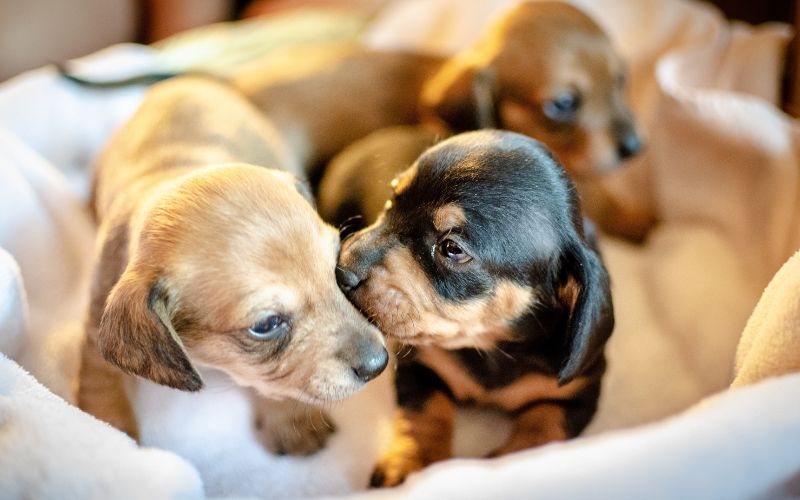Welcoming a new puppy into your home is an exciting and rewarding experience, but it also comes with its own set of challenges.
One of the most important aspects of new puppy training is teaching them the essential skills they need to become well-behaved and obedient companions.
From house training to socialisation, there are a myriad of things a new puppy needs to learn in order to thrive in their new environment.
In this article, we will discuss the top things to teach your new puppy for a well-behaved companion.
From basic obedience commands like sit and stay, to more advanced skills such as walking on a lead and coming when called, we will cover all the essential training techniques to help him to become a polite and well-mannered member of the family.
Whether you are a first-time owner or a seasoned pet parent, these tips and tricks will set you and the new family member on the path to a happy and harmonious relationship.
When should the training sessions start?
The training needs to start as soon as he comes home.
This does not mean teaching him to sit and stay but instead helping him to become familiar with the ways of the household and how to behave.
Puppies are clever and learn quickly so it’s important to introduce some basic manners into your puppy’s life from an early age.
Among the things to teach your new puppy are:
Not jumping onto the furniture
Not nipping hands
Not barking for attention
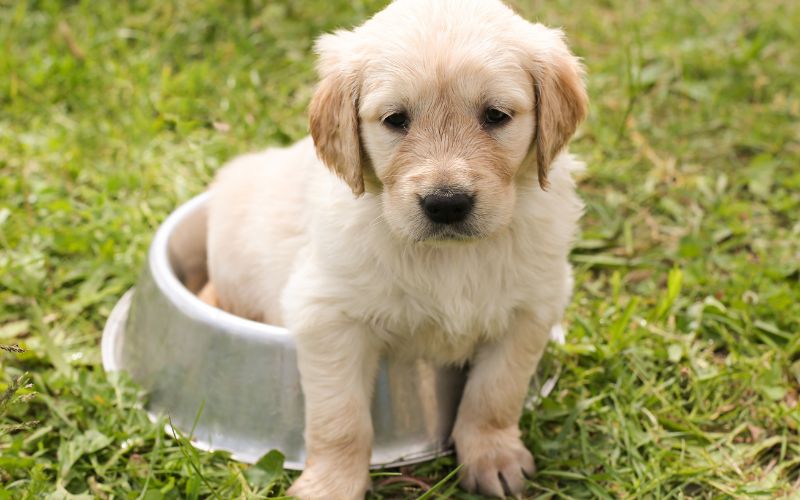
Understanding Your Puppy’s Behavioural Development
Understanding your puppy’s behavioural development is crucial for building a strong bond and nurturing a well-adjusted adult dog.
Puppies go through several stages of development, each with its own unique behaviours and needs.
The neonatal period, which lasts for the first two weeks of life, is characterized by limited mobility and dependency on the mother.
Then comes the transitional period, from 2-3 weeks old, when he starts to explore his environment and develop social skills with its littermates.
At around 3-12 weeks old, puppies enter the socialisation period, during which they form attachments to humans and learn important social cues.
It is crucial to expose them to a variety of stimuli and experiences during this time to prevent fear and aggression issues later in life.
Around 3-6 months old, puppies enter the juvenile period, where they may become more independent and test boundaries.
Understanding these stages can help you tailor your training and socialisation efforts to meet your puppy’s specific needs.
It’s important to provide plenty of positive reinforcement, patience, and consistency to encourage desirable behaviours and discourage unwanted ones.
Introduce the youngster to his/her surroundings
It’s important to remember that this youngster has been taken from his familiar surroundings and moved into a new, strange place that has different sounds, sights and smells.
He will be nervous and maybe a little overwhelmed so you’ll need to take things slowly and allow him to settle into his new home.
Create an area where he will be safe, where he can eat, play and sleep.
Take him outside when you need him to go to the toilet which will be when he wakes up, after meals and at regular times during the day.

Create a routine
Puppies are a lot of work, but they can also be a lot of fun. A big part of making sure that puppies grow up to be a happy and healthy dog is by creating a routine for them.
This routine should include regular meal times, plenty of opportunities for exercise, and regular toilet breaks.
It’s important to be consistent with the routine, so that he knows what to expect and can start to learn basic obedience commands.
With a little patience and effort, you’ll have your furry friend well-trained in no time.
Spend time with your puppy
It’s vital that you spend time with your new canine friend.
Time spent playing, relaxing and enjoying things such as walks, will all pay off in the long run.
Your puppy needs to develop a relationship with you and needs to trust you.
Be consistent with training and your other expectations. If you are not consistent then he’ll be confused and won’t know what is expected of him.
Be fair. There’s no room or need to punish a dog and if you are physically abusive then your dog will never trust you.
Protect your dog and never take him into a dangerous situation.
Be aware of him when introducing him to new situations or people and always try to see things from his perspective. Always keep him safe.
Teaching him his name
With new puppy training, it’s important to start with short and positive training sessions.
Use high-value treats to get his attention and call his name in a cheerful and upbeat tone.
When he looks at you after hearing his name, immediately reward him and offer praise.
Repeat this process several times a day to reinforce the association between his name and something positive.
It’s important to be patient and consistent during training, as it may take some time for your puppy to fully understand and respond to his name.
Avoid using his name in a negative context, as you want him to associate it with positive experiences.
Once your puppy consistently responds to his name, you can start using it to redirect his attention or call him to you.
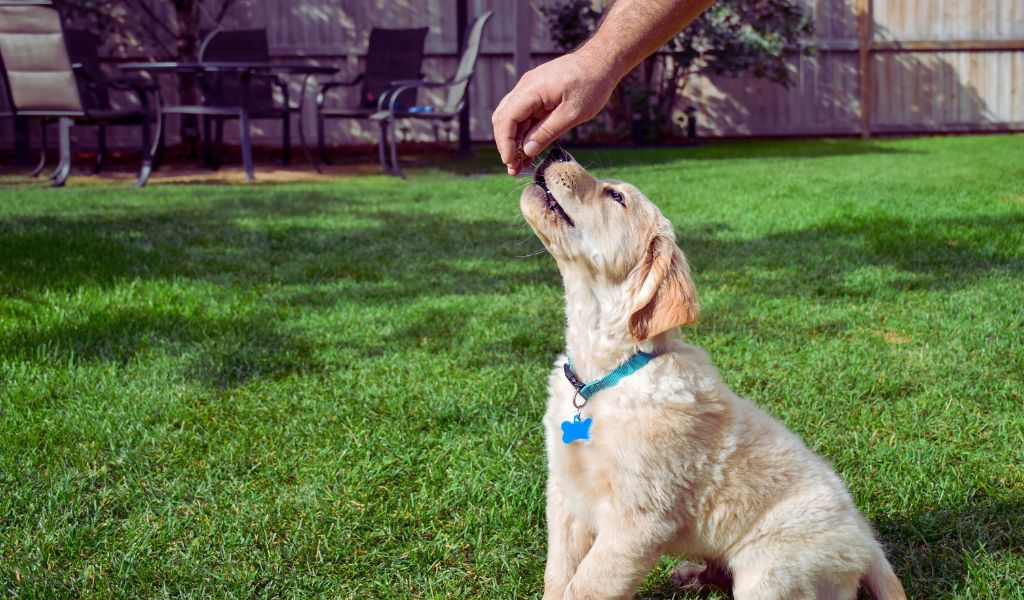
Practice his name in different environments and with distractions present to ensure that he can respond regardless of the situation.
As your puppy grows older, continue reinforcing his name through positive reinforcement and regular training sessions.
When you teach a puppy his name in a positive and consistent manner, you can build a strong foundation for communication and obedience in the future.
Crate Training and House Training
Crate training and house training are two important aspects of teaching your dog good behaviour and creating a harmonious living environment for both of you.
Crate training involves getting your dog used to being in a crate for short periods of time as a safe and secure space.
This can be helpful for managing their behaviour, preventing destructive habits, and providing a comfortable space for them to relax.
House training, on the other hand, involves teaching your dog to go to the bathroom outside, in a designated spot.
This means establishing a routine and, by taking them out frequently, and praising and rewarding them when they go in the desired location, you will soon teach a puppy to use the toilet outside.
Both of these training methods take patience, consistency, and positive reinforcement. They also help establish a strong bond between you and your dog, as they learn to trust and rely on you for guidance and care.
With crate training and house training, you can set your dog up for success and create a happy and well-behaved member of the family.
Socialisation and Exposure for puppies
Socialisation and exposure are essential activities for new puppy training and will help puppies to develop into well-adjusted and confident adults.
During the critical socialisation period, which occurs between 3 and 14 weeks of age, puppies should be exposed to a wide variety of people, places, and experiences.
This exposure helps them to become familiar with the world around them and learn to navigate new situations with ease.
It is important for puppies to interact with people of different ages, genders, and ethnicities, as well as other animals, in order to prevent fear or aggression towards unfamiliar individuals later in life.
Positive experiences during this time can also help to reduce the likelihood of developing behaviour problems, such as anxiety and phobias.
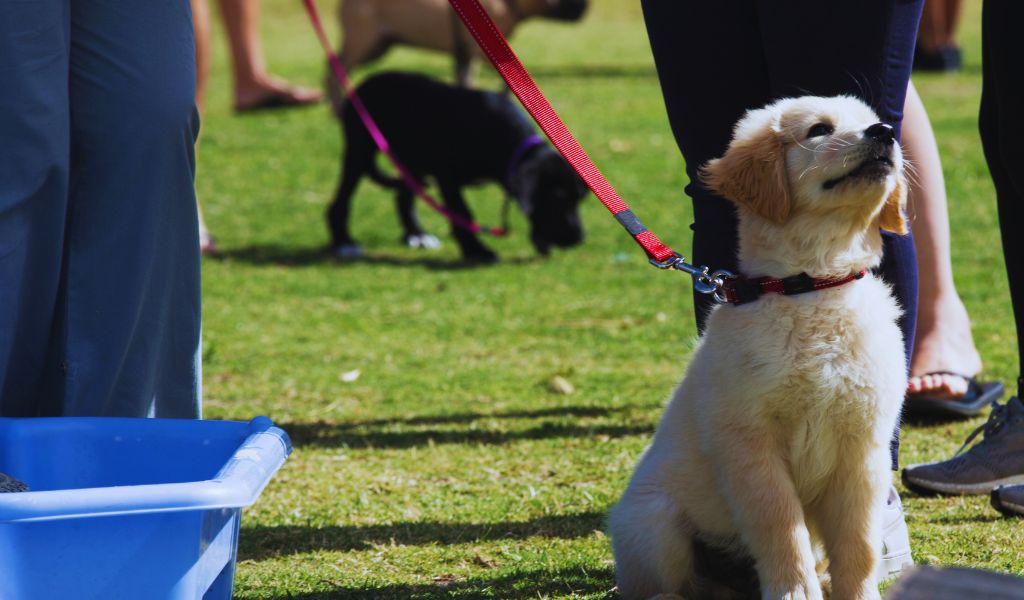
It is equally important to expose puppies to different environments, such as parks, footpaths, and busy streets, to help them become accustomed to various sights, sounds, and smells.
However, it is crucial to ensure that these experiences are positive and not overwhelming for the puppy.
Gradual introduction to new stimuli and positive reinforcement can help to build a puppy’s confidence and resilience.
By providing ample socialisation and exposure opportunities, puppy owners can set their furry companions up for a lifetime of success and happiness.
Teaching Basic Commands – Sit, Stay, and Come
Teaching basic commands like sit, stay, and come is essential for any dog owner.
These commands are among the first that you should embark on during new puppy training as they will help you to manage your dog’s behaviour, keeping them safe and helping them to become well behaved and sociable adult dogs.
When teaching the sit command, start by holding a treat close to your dog’s nose and then slowly lift it above their head.
As their nose lifts up to follow the treat, their bottom should naturally lower to the ground.
Once in the sitting position, give the command “sit” and reward them with the treat.
The key to teaching the stay command is to start with small steps and gradually increase the time and distance.
Begin by having your dog sit, then take a small step back and say “stay.” If they stay in place, reward them with a treat and praise.
Gradually increase the distance and time before giving the reward.
When teaching the come command, it’s important to always use a positive and excited tone. Start by getting your dog to stay, then take a few steps back and call their name followed by the command “come.”
When they come to you, reward them with a treat and plenty of praise.
Consistency and patience are key when teaching these commands, and with practice, your dog will become a well-behaved and obedient companion.
Lead Training and Walking Etiquette
Lead training and walking etiquette are essential for both the safety and enjoyment of both you and your dog.
Proper lead training ensures that your dog learns to walk calmly and obediently by your side, without pulling or lunging.
This not only prevents any potential accidents or injuries but also creates a more pleasant walking experience for both you and your pet.
When it comes to walking etiquette, it’s important to teach your dog to greet others politely, without jumping or barking, and to be respectful of other dogs and their owners.
This can be achieved through consistent training and positive reinforcement.
It’s also important to be mindful of others when walking your dog in public spaces, always keeping your dog on a lead and being aware of your surroundings.
Remember to always clean up after your dog and be considerate of others who may not be as comfortable around dogs.
By instilling good lead training and walking etiquette, you can ensure that you and your dog can enjoy peaceful and safe walks together.
It’s a way to show respect for others in the community and maintain a positive relationship with animals. Plus, it creates a bond of trust and understanding between you and your furry friend.
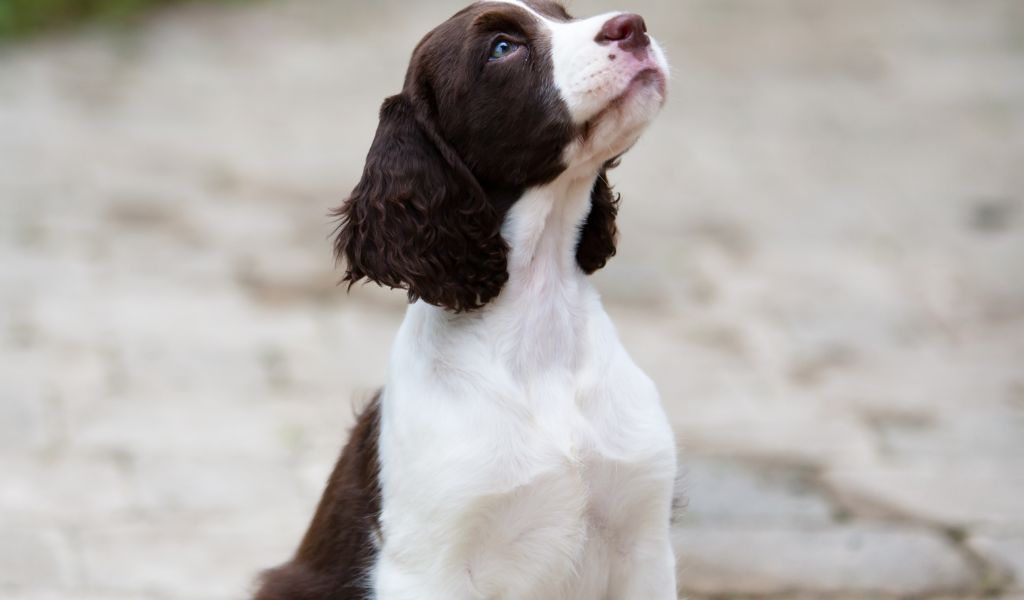
Teach Your Puppy To Leave It
Teaching your puppy to “leave it” is an important skill that can prevent them from getting into potentially dangerous situations.
To start, you’ll want to have some treats handy. Put a low-value item, like a toy, on the floor.
As soon as your puppy shows interest in the item, say “leave it” and cover the item with your foot.
Wait until your puppy loses interest and looks at you, then praise and reward them with a high-value treat.
Repeat this exercise several times, gradually increasing the difficulty by using higher-value items.
Once your puppy consistently responds to the “leave it” command, you can start using it in real-life situations.
For example, if your puppy starts to pick up something they shouldn’t have, say “leave it” and redirect their attention to a toy or treat that is appropriate.
With consistent practice, your puppy will learn to respond to the “leave it” command and will be less likely to grab or eat things they shouldn’t.
Remember to always use positive reinforcement and never punish your puppy for not understanding the command right away. Patience and consistency are key when teaching your puppy this important skill.
Teach Your Puppy To Lie Down
Teaching your puppy to lie down is an important command to ensure their obedience and safety.
Start by getting your puppy’s attention with a treat in your hand. Hold the treat close to their nose and slowly bring it down to the ground while giving the command “down.”
As your puppy follows the treat, gently guide them into a lying position. Use verbal praise and give them the treat once they are in the down position.
It’s important to be patient and consistent with your training, as some puppies may take longer to understand the command.
Repeat this process multiple times throughout the day, gradually reducing the use of the treat as your puppy becomes more familiar with the command.
Be sure to use the same command and hand gesture each time you practice, as consistency is key in training. Also, avoid using force or punishment, as this can create fear and unwillingness to follow commands.
As your puppy gets more comfortable with the “down” command, you can start practicing in different environments and with various distractions to solidify their understanding.
With time and practice, your puppy will become accustomed to lying down on command, making them a well-behaved and obedient companion.
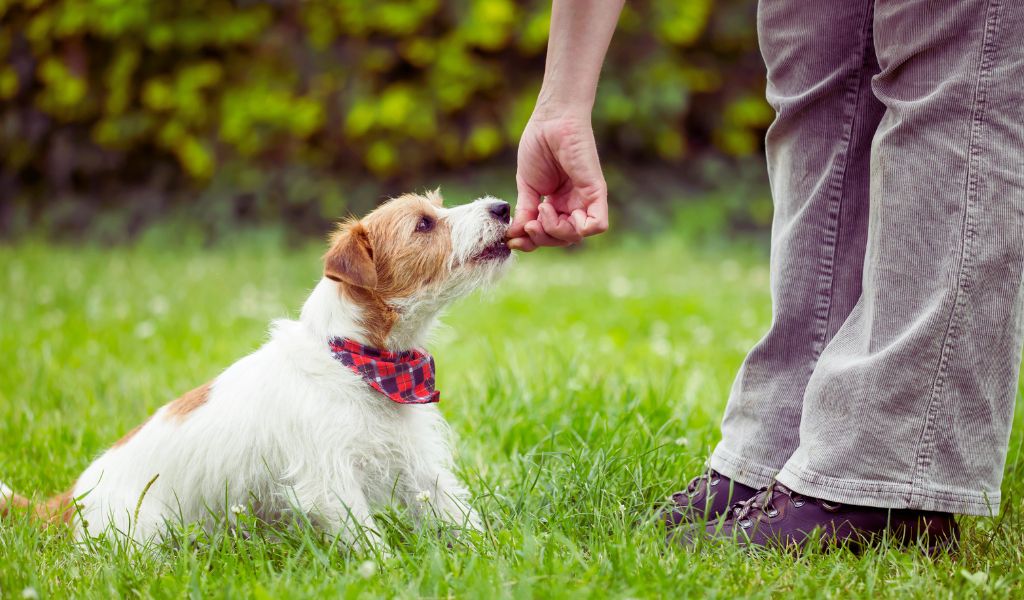
Teach Your Puppy To Pay Attention to you and focus
When it comes to training your puppy, the ability to focus and pay attention is crucial.
Teaching your puppy to pay attention to you will not only make training sessions more effective, but it will also strengthen the bond between you and your furry friend.
One way to teach your puppy to pay attention to you is by using positive reinforcement. Reward your puppy with treats and praise when they look at you or respond to their name.
It’s important to keep training sessions short and fun to prevent your puppy from getting bored or overwhelmed.
Another technique to teach your puppy to focus on you is by mastering basic obedience commands such as sit, stay, and come.
Start in a quiet, distraction-free environment and gradually increase the level of distractions as your puppy becomes more proficient at paying attention to you.
Consistency is key when it comes to teaching your puppy to focus on you, so make sure to practice regularly and be patient.
Teach Your Puppy To Heel
Teaching your puppy to heel is an important part of their training.
It will not only keep them safe and under control when out for walks, but it will also strengthen the bond between you and your furry friend.
To start, make sure your puppy is wearing a properly fitted collar or harness and a comfortable, non-retractable lead.
Begin by walking your puppy on a loose leash and using treats or a toy to keep their attention focused on you. As you walk, use a command such as “heel” and gently guide your puppy to your side.
Reward them with a treat or praise when they walk by your side without pulling or wandering off. It’s important to be patient and consistent with this training, as puppies can easily become distracted.
Practice this skill in different environments to help your puppy generalize the behaviour.
Gradually phase out the use of treats as your puppy becomes more consistent with heeling, but be sure to continue to praise and reward them for their good behaviour.
Always be gentle with your puppy and never yank or pull on the leash, as this can cause fear or anxiety.
With time and patience, your puppy will learn to heel and walk by your side like the well-behaved companion you know they can be.
Positive Reinforcement Techniques and Reward-Based Training for a puppy
Positive reinforcement techniques and reward-based training are highly effective methods for teaching and guiding a puppy.
When using positive reinforcement, the focus is on rewarding desirable behaviours rather than punishing unwanted ones.
This approach helps to create a positive and nurturing environment for the puppy, leading to better learning and a stronger bond between the puppy and its owner.
Treats, praise, and toys can be used as rewards for good behaviour, and consistency is key to reinforcing the desired actions.
For example, when teaching a puppy to sit, the trainer would give the command and then reward the puppy with a treat when it obeys.
This teaches the puppy to associate the action of sitting with a positive outcome, making it more likely to repeat the behaviour in the future.
Additionally, reward-based training allows for a smoother and more enjoyable training process, as the focus is on encouraging and rewarding the puppy for its efforts rather than scolding or intimidating it.
It helps to build the puppy’s confidence and encourages a willingness to learn and engage with its owner.
Overall, positive reinforcement techniques and reward-based training are beneficial for both the puppy and its owner, leading to a well-behaved and happy canine companion.
Preventing or Correcting Destructive Puppy Behaviours
When it comes to preventing or correcting destructive puppy behaviours, consistency, patience, and positive reinforcement are key.
Puppies are naturally curious and full of energy, which can sometimes lead to behaviours like chewing, digging, or excessive barking.
To prevent these behaviours, it’s important to provide plenty of mental and physical stimulation through activities and toys.
Additionally, crate training can help prevent destructive behaviours when unsupervised.
When it comes to correcting these behaviours, it’s important to remember that puppies respond best to positive reinforcement.
Instead of scolding or punishing a puppy for destructive behaviour, it’s more effective to redirect their attention and reward them for appropriate behaviors.
For example, if a puppy starts to chew on furniture, gently take the object away and give them a chew toy instead, praising them for chewing on the appropriate item.
Consistency is also crucial when it comes to correcting destructive behaviours. It’s important for all family members to be on the same page and enforce the same rules consistently.
It’s also important to be patient and understand that it takes time for puppies to learn and develop good behaviors.
With the right approach, consistency, and patience, it’s possible to prevent and correct destructive puppy behaviours in a positive and effective manner.
Addressing Separation Anxiety in Puppies
Addressing separation anxiety in puppies is an important part of their training and socialization.
It’s normal for puppies to experience some level of anxiety when left alone, but it’s essential to address this behaviour early on to prevent it from developing into a more severe problem.
One effective way to help alleviate separation anxiety in puppies is to gradually accustom them to being alone.
Start by leaving the puppy alone for short periods of time and gradually increasing the duration over time. This will help the puppy learn that being alone is not a scary or traumatic experience.
It’s also important to create a positive association with being alone by providing the puppy with toys or treats that they can enjoy while on their own.
Additionally, establishing a routine and providing plenty of exercise and mental stimulation can also help reduce separation anxiety.
Crating the puppy can also provide a safe and comforting space for them while they are alone.
Finally, it’s essential for pet owners to remain calm and composed when leaving or returning home, as a high level of excitement can exacerbate the puppy’s anxiety.
With patience, consistency, and positive reinforcement, separation anxiety in puppies can be effectively managed, leading to a happier and more well-adjusted pet.
Managing Teething and Mouthing in a puppy
When a puppy is teething, it’s important for pet owners to manage their behaviour and provide appropriate outlets for their natural chewing instinct.
Teething typically occurs between the ages of 3 and 6 months, and during this time, puppies will experience discomfort and irritability as their adult teeth come in and their baby teeth fall out.
To help manage this process, pet owners can provide their puppies with safe and durable chew toys to soothe their gums and satisfy their urge to chew.
It’s also important to discourage mouthing behaviour, where puppies may try to chew on hands, feet, or clothing. This can be addressed through positive reinforcement training and redirection to appropriate chew toys.
Additionally, pet owners can use bitter-tasting sprays or deterrents on items they don’t want the puppy to chew on, such as furniture or shoes.
Consistency and patience are key when managing teething and mouthing in a puppy, as it may take time for them to learn appropriate chewing behavior.
And it’s important to remember that teething is a temporary phase that will pass as the puppy’s adult teeth come in.
By providing the right guidance and outlets for their natural instincts, pet owners can help their puppies navigate this developmental stage with minimal damage to household items and minimal frustration for both the puppy and the owner.
The Role of Consistency and Patience in Puppy Training
Consistency is important because it helps your puppy understand what is expected of them.
By consistently using the same cues and routines, your puppy will start to recognize and respond to them more quickly.
This also means being consistent in your reactions to their behaviour, whether it’s positive reinforcement for good behaviour or redirecting them away from bad behaviour.
Patience is equally important because it takes time for a puppy to learn and adjust to their new environment and rules.
Puppies are like sponges, soaking up information and experiences, but they also have short attention spans and can easily become overwhelmed. It’s important to be patient and not get frustrated when they don’t immediately grasp a command or concept.
Remember that they are still learning and it’s up to you to guide them and help them understand.
Consistency and patience go hand in hand in puppy training.
With consistent training and patient guidance, your puppy will be more likely to understand and respond to your commands, ultimately leading to a well-behaved and happy companion.
So, while it may take some time and effort, the rewards of a well-trained puppy are well worth it.
Common Mistakes to Avoid in Puppy Training
Puppy training can be both rewarding and challenging, and there are common mistakes that many new dog owners make.
One of the biggest mistakes is inconsistency in training. It’s important to establish clear boundaries and rules for your puppy and to be consistent in enforcing them.
This includes sticking to a regular schedule for feeding, walking, and potty breaks.
Another common mistake is using punishment-based training methods. Positive reinforcement is much more effective in teaching your puppy desired behaviours.
Additionally, many owners make the mistake of not socialising their puppy enough. Exposing your puppy to different people, animals, and environments from a young age is crucial for their development.
Proper socialisation can help prevent anxiety and behaviour issues in the future.
Lastly, some owners make the mistake of not providing enough mental stimulation for their puppy.
Boredom can lead to destructive behaviours, so it’s important to provide toys, puzzles, and interactive games to keep your puppy mentally engaged.
By avoiding these common mistakes and seeking the guidance of a professional trainer if needed, you can set your puppy up for success and build a strong, positive bond with your furry companion.
Recommended Tools and Supplies for Puppy Training
When it comes to puppy training, having the right tools and supplies can make a big difference in the success of the process.
One essential tool for puppy training is a sturdy and comfortable collar and lead. These are necessary for teaching your puppy to walk on a lead and for providing control and guidance during training sessions.
Another important supply is high-quality dog treats, which can be used as positive reinforcement for good behaviour. Look for small, soft treats that are easy for your puppy to chew and digest.
A training crate is also highly recommended for puppy training, as it provides a safe and secure place for your puppy to rest.
Additionally, you may want to invest in some interactive toys to keep your puppy engaged and mentally stimulated, as well as grooming supplies for maintaining your puppy’s coat and hygiene.
Finally, consider enrolling in a puppy training class or hiring a professional trainer for guidance and support. This can be especially helpful for first-time puppy owners or for those who are struggling with specific training challenges.
With the right tools and supplies, as well as the proper guidance, you can set your puppy up for a lifetime of good behaviour and obedience.
Tips for Integrating Training into a puppy’s Daily Life
Integrating training into a puppy’s daily life is crucial for their development and overall behaviour.
One important tip is to make training sessions short and frequent. Puppies have short attention spans, so keeping training sessions brief will prevent them from getting bored or frustrated.
It’s also important to integrate training into everyday activities, such as meal times and walks.
For example, practicing “sit” and “stay” commands before feeding the puppy can help reinforce these behaviours.
Additionally, using positive reinforcement, such as treats or praise, can be highly effective in encouraging good behaviour.
Consistency is key when it comes to training, so it’s important for all members of the household to be on the same page and enforce the same rules.
Another helpful tip is to be patient and understanding with the puppy. They are still learning and may make mistakes, so it’s important to remain calm and consistent with training.
Finally, enrolling in a puppy training class or working with a professional trainer can provide valuable guidance and support.
By integrating training into a puppy’s daily routine in a positive and consistent manner, they can develop into well-behaved and well-adjusted adult dogs.
FAQS About The Top Things to Teach Your New Puppy for a Well-Behaved Companion
What are the most important things to teach your new puppy for a well-behaved companion?
When it comes to puppy training, it’s important to start with the basics. Teaching your new puppy essential commands and behaviours will set the foundation for a well-behaved companion.
It’s crucial to focus on training your puppy early to establish good habits and a strong bond between you and your furry friend.
What are the top commands to teach your new puppy?
There are several commands to teach your puppy to ensure they grow into a well-behaved companion.
These may include “sit,” “stay,” “come,” “down,” and “leave it.” By incorporating these training commands into your puppy training sessions, you can instill obedience and good behaviour.
How can you start training your puppy for the first time?
When you bring a new puppy into your home, it’s important to start training early. Begin with basic commands and socialization to make sure your puppy is on the right track.
Use positive reinforcement and patience to guide your pup through the training process.
Is it important to crate train your new puppy?
Crate training is an important aspect of puppy training. It provides a secure and safe space for your puppy.
It’s crucial to make sure your puppy views the crate as a positive environment and not as a form of punishment.
What are some essential tips for crate training your puppy?
When crate training your puppy, it’s essential to take your puppy to the crate frequently, especially during potty training.
It’s also important to ensure that the crate is properly sized and cozy so that your puppy feels comfortable and secure.
How do you teach a new puppy to come when called?
Teaching your puppy to come when called is an essential part of obedience training. Utilise positive reinforcement, such as treats or praise, to encourage your puppy to come to you when called.
Keep training sessions short and enjoyable to prevent your puppy from becoming bored and distracted.

